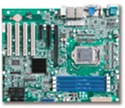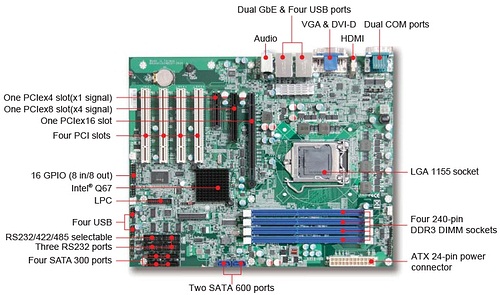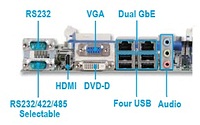Industrial ATX board switches to Sandy Bridge Cores
Feb 8, 2011 — by LinuxDevices Staff — from the LinuxDevices Archive — 2 viewsPortwell announced an industrial ATX motherboard that supports Intel's “second-generation” Core i3, i5, or i7 processors. The Ruby-D712VG2AR offers up to 16GB of DDR3 RAM, four PCI slots and three PCI Express slots, six serial ports, plus VGA, HDMI, and DVI-D video outputs, the company says.
 Last year, Portwell released the Ruby-M710VG2AR, an ATX board that supported the then-current Core i3, i5, and i7 CPUs via the Intel QM57 Express chipset. The Ruby-D712VG2AR (right) is a new version that provides essentially the same capabilities but steps up to Intel's "Sandy Bridge" Cores, announced last month.
Last year, Portwell released the Ruby-M710VG2AR, an ATX board that supported the then-current Core i3, i5, and i7 CPUs via the Intel QM57 Express chipset. The Ruby-D712VG2AR (right) is a new version that provides essentially the same capabilities but steps up to Intel's "Sandy Bridge" Cores, announced last month.
The Sandy Bridge chips retain the previous 32nm production process, but are Intel's first to put the CPU, memory controller, and GPU (graphics processing unit) all on one die. They also include a new microarchitecture, a 256-bit instruction set known as AVX (advanced vector extensions), enhanced GPUs (graphics processing units), and dedicated silicon for tasks such as transcoding video from one format to another, according to the chipmaker.
Given their on-chip graphics and memory controllers, the Sandy Bridge chips relatively simple I/O controllers, which are offered in at least ten models collectively code-named Cougar Point. Unfortunately, Intel has disclosed a flaw in these "6 Series" controllers that renders their 3Gbps SATA ports subject to failure. As a result, device manufacturers will either have to delay their products, or ensure that only 6Gbps ports are used.

Portwell's Ruby-D712VG2AR
Portwell's Ruby-D712VG2AR, using the Q67 Express chipset, is one of the affected products, and the company has not provided any availability updates. But the intent is obviously for the board to provide two 6Gbps SATA ports and four 3Gbps ports (with available RAID 0/1/5/10 configurations), as pictured above.
According to Portwell, the Ruby-D712VG2AR accepts a variety of Core i3, i5, and i7 CPUs (maximum clock speed not stated) in its LGA1155 socket, and is expandable to 16GB of DDR3 RAM via four DIMM sockets. Meanwhile, the board has room for four full-length PCI slots, one PCI Express x16 slot, one PCI Express x8 slot, and one PCI Express x4 slot, according to the company.
 The board's coastline (right) offers dual gigabit Ethernet ports, four USB 2.0 ports, two serial ports (one RS232, one RS232/422/485), plus audio I/O (mic in, line in, line out). Also included are three video outputs — HDMI, VGA, and DVI-D — any two of which may be used simultaneously, according to Portwell.
The board's coastline (right) offers dual gigabit Ethernet ports, four USB 2.0 ports, two serial ports (one RS232, one RS232/422/485), plus audio I/O (mic in, line in, line out). Also included are three video outputs — HDMI, VGA, and DVI-D — any two of which may be used simultaneously, according to Portwell.
Portwell says the Ruby-D712VG2AR has four further serial ports (three RS232, one RS232/422/485) internally. Also supplied via headers are eight additional USB 2.0 ports and 16 GPIOs (eight in, eight out), the company adds.
According to Portwell, the board supports Intel's Active Management Technology 7.0 and has an onboard watchdog timer. Operating system support was not cited, but should include pretty much any x86 OS.
Features and specifications listed by Portwell for the Ruby-D712VG2AR include:
- Processor — LGA155-socketed Core i3, i5, or i7 processors
- Chipset — Q67 Express
- Memory — up to 16GB of DDR3 RAM via four slots
- Expansion:
- 4 x PCI slots
- 1 x PCI Express x16 slot
- 1 x PCI Express x8 slot
- 1 x PCI Express x4 slot
- Networking — 2 x gigabit Ethernet
- Other I/O:
- 2 x SATA 600 (6Gbps)
- 4 x SATA 300 (3Gbps)
- 1 x VGA
- 1 x HDMI
- 1 x DVI-D
- 12 x USB 2.0 (4 external, 8 internal)
- 6 x serial (1 x RS232 and 1 x RS232/422/485 external, 3 x RS232 and 1 x RS232/422/485 internal)
- audio — mic in, line in, line out
- LPC
- 16 x GPIO (8 in, 8 out)
- Operating range — 32 to 140 deg. F (0 to 60 deg. C)
- Power requirements — ATX power supply; consumption n/s
- Dimensions — 12 x 9.6 inches
Further information
Portwell provided no word about pricing or availability for the Ruby-D712VG2AR. More information may be found on the Ruby-D712VG2AR product page.
This article was originally published on LinuxDevices.com and has been donated to the open source community by QuinStreet Inc. Please visit LinuxToday.com for up-to-date news and articles about Linux and open source.